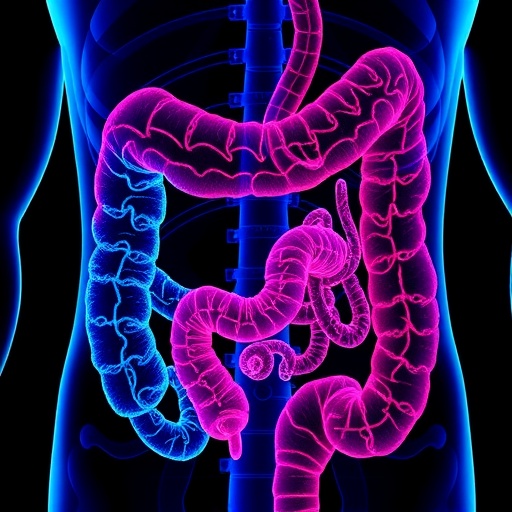In a groundbreaking study published in Nature Communications, researchers uncover how the interplay between inflammation and mutational burden distinctly influences the therapeutic efficacy of two immune checkpoint inhibitors, nivolumab and ipilimumab, in colorectal cancer. This revelation could recalibrate how clinicians tailor immunotherapy regimens, optimizing treatment outcomes for patients facing this formidable malignancy.
Advancements in immuno-oncology have transformed the landscape of cancer treatment, yet colorectal cancer remains a challenging entity. Despite the success of immune checkpoint inhibitors targeting PD-1 and CTLA-4 pathways, response rates in colorectal cancer are notoriously heterogeneous. The study led by Lei, Overman, Yao, and colleagues unveils the critical molecular and immunological underpinnings that dictate differential responses to combined nivolumab or ipilimumab therapies.
Nivolumab, a PD-1 inhibitor, and ipilimumab, a CTLA-4 inhibitor, have individually exhibited therapeutic promise across various malignancies, but their combined effects in colorectal cancer had lacked clarity. The novel research meticulously evaluates the relationship between tumor mutational burden (TMB), inflammatory markers, and clinical responses, revealing that TMB and inflammation serve as segregated yet pivotal parameters in predicting immunotherapy outcomes.
The team harnessed comprehensive genomic profiling techniques alongside sophisticated immunological assays to quantify mutational load and inflammatory signatures in tumor biopsies. Their multi-dimensional approach enabled a nuanced dissection of the cancer microenvironment, highlighting how mutational landscapes govern neoantigen generation and immune visibility, while inflammation modulates immune cell infiltration and activation dynamics.
Intriguingly, the findings demonstrated that elevated tumor mutational burden correlated strongly with enhanced efficacy of nivolumab combination therapy, suggesting that a higher neoantigenic load primes the immune system for PD-1 blockade. Conversely, inflammatory signals within the tumor microenvironment were more predictive of ipilimumab combination success, indicating that CTLA-4 blockade may be particularly effective in tumors characterized by robust inflammatory states.
This dichotomy underscores the necessity of individualized biomarker assessment prior to treatment initiation, as patients presenting with high TMB but lower inflammation may benefit more from nivolumab-based regimens. Alternatively, those with pronounced inflammatory profiles could be prime candidates for ipilimumab-inclusive therapies. Such stratification promises to enhance precision oncology efforts and reduce exposure to ineffective treatments.
The mechanistic insights derived from this work illuminate the distinct biological pathways modulated by PD-1 and CTLA-4 checkpoint inhibition. While nivolumab appears to leverage neoantigen-driven T cell recognition, ipilimumab’s therapeutic efficacy is closely tied to remodeling of the immunosuppressive microenvironment influenced by inflammatory cytokines and immune cell subsets.
Moreover, this study advances fundamental understanding of colorectal cancer’s immunobiology. It challenges previous assumptions that tumor mutational burden alone governs immunotherapy responsiveness, instead highlighting the complementary role of the inflammatory milieu. This paradigm shift may inspire future investigations into combinatorial immunomodulation aimed at amplifying both neoantigen presentation and inflammatory potentiation.
In clinical practice, such revelations carry profound implications. Oncologists could soon incorporate concurrent assessments of mutational burden and inflammation-related biomarkers, such as cytokine profiles or immune cell infiltration patterns, into standard diagnostic workflows. This integrative strategy could streamline treatment selection, minimize adverse effects, and ultimately improve survival outcomes in colorectal cancer.
The study also prompts a reevaluation of ongoing and future clinical trials involving checkpoint inhibitors in colorectal cancer. Trial designs incorporating biomarker-driven patient stratification could accelerate the discovery of optimal therapeutic combinations and dosing schedules. Additionally, these insights may pave the way for novel agents that synergize with PD-1 or CTLA-4 blockade by modulating mutational dynamics or inflammatory pathways.
Beyond colorectal cancer, the implications of this research extend to other malignancies with variable inflammatory and mutational landscapes. Understanding how these factors interface with immune checkpoint blockade could catalyze broader applications of precision immunotherapy across diverse tumor types, transforming current oncologic paradigms.
The meticulous methodology employed by the researchers, coupling state-of-the-art genomic sequencing with detailed immune profiling, exemplifies the power of integrated multi-omics approaches. Such comprehensive analysis is essential to unravel the complex tumor-immune interactions that dictate therapeutic response and resistance mechanisms.
Future research directions inspired by this study may focus on elucidating the molecular drivers of inflammation within colorectal tumors and how they can be modulated therapeutically. Identifying specific cytokines or immune cell populations responsible for potentiating ipilimumab efficacy could yield actionable targets, enabling the design of next-generation combination regimens.
Furthermore, the interplay between mutational burden and inflammation may be influenced by additional factors such as the gut microbiome, metabolic state, and host genetics. Integrating these dimensions into immunotherapy research could unlock even greater potential for personalization and effectiveness.
As immunotherapy continues to revolutionize cancer care, studies like this underscore the critical importance of context-specific biomarkers. The nuanced understanding of how inflammation and mutational burden differentially shape responses to nivolumab and ipilimumab in colorectal cancer marks a significant leap forward, offering hope for more tailored and effective treatments against this challenging disease.
This landmark publication sets a new benchmark, reinforcing that successful immunotherapy hinges on exploring the intricate tumor ecosystem. By embracing complexity and integrating multi-faceted biomarkers, the oncology community moves closer to realizing the full promise of precision immuno-oncology.
Subject of Research: Colorectal cancer immunotherapy, specifically the differential association of inflammation and tumor mutational burden with the efficacy of combined nivolumab and ipilimumab treatments.
Article Title: Inflammation and mutational burden differentially associated with nivolumab or ipilimumab combination efficacy in colorectal cancer.
Article References:
Lei, M., Overman, M.J., Yao, J. et al. Inflammation and mutational burden differentially associated with nivolumab or ipilimumab combination efficacy in colorectal cancer. Nat Commun 16, 8868 (2025). https://doi.org/10.1038/s41467-025-63960-8
Image Credits: AI Generated




